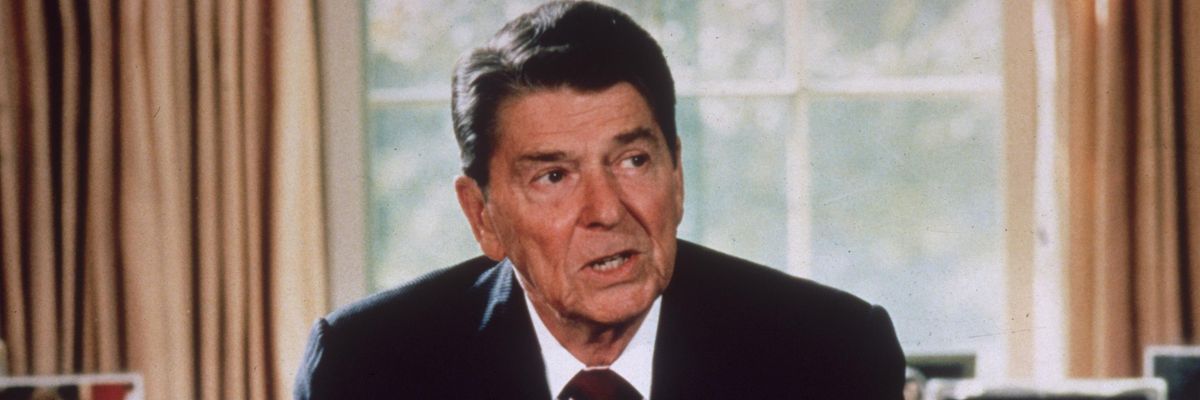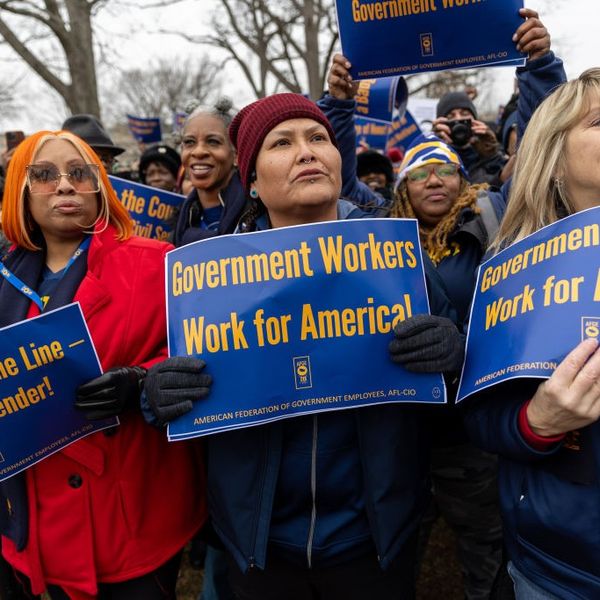
President Ronald Reagan, whose administration saw a five percent drop in American workers' union membership, is being inducted into the Department of Labor's Hall of Honor. (Photo: Hulton Archive/Getty Images)
Trump Labor Department to Honor Anti-Labor President Ronald Reagan
Announcement of Reagan's induction into the Hall of Honor leaves out his firing of 11,000 striking workers
A month after beginning to roll back the Obama administration's rules making more Americans eligible for overtime pay, Donald Trump's Department of Labor again displayed a lack of concern for workers when it announced its very first inductee to its Hall of Honor would be President Ronald Reagan, "who openly and actively diminished the power of American labor unions."
The Hall of Honor is meant "to honor Americans whose distinctive contributions have elevated working conditions, wages, and overall quality of life for American families." While Reagan had been the president of the Screen Actors Guild during his acting career, his most significant labor-related action during his two terms in the White House was his firing of 11,000 striking air traffic controllers in 1981
The workers had walked out of their jobs when negotiations with the Federal Aviation Administration stalled. The air traffic controllers' union, whose members perform a job that's been recognized as one of the most high-stress occupations, had been seeking annual wage increases of $10,000 and a reduction of their weekly hours from 40 to 32.
Reagan's abrupt dismissal of the workers represented a change in politicians' relationship with American workers. Union membership declined by about five percent during Reagan's term, and labor historian Joseph A. McCartin has noted that the event put in motion a shift in how Republican leaders interact with the labor movement.
"Gov. Scott Walker of Wisconsin invoked Reagan's handling of [the strike] as he prepared to 'change history' by stripping public employees of collective bargaining rights in a party-line vote," he wrote in a New York Times editorial in 2011.
Critics, including union organizers, spoke out against Reagan's induction on social media, noting the irony of the choice.
\u201cUnfortunately he was really good at busting them too. https://t.co/Qiq2P7YOvm\u201d— Alan (@Alan) 1503605185
\u201cTrump Labor Department honors Ronald Reagan as labor hero, because of course https://t.co/NSW1Iv0W8H by @ZaidJilani\u201d— Teamsters (@Teamsters) 1503674804
\u201cJust in time for Trump's "labor" dept to troll us by honoring Reagan, we explain why Reagan was an enemy of labor https://t.co/wmsTbLgLyH\u201d— Sarah Jaffe (@Sarah Jaffe) 1503679873
The department's announcement coincided with a new report by the Economic Policy Institute, released Thursday, showing the decline in union membership over the last four decades and its impact on workers. "Since the 1970s, declining unionization has fueled rising inequality and stalled economic progress for the broad American middle class," says the report. "When unions are weak, the highest incomes go up even more, but when unions are strong, middle incomes go up."
The Labor Department's decision to honor Reagan suggests that the Trump administration is equating his contributions to the labor movement with those of past inductees including social justice organizers Eugene Debs and Bayard Rustin, the Chinese workers who fought for safer working conditions while completing the transcontinental railroad in the 19th century, and the Memphis sanitation workers who unionized after staging huge peaceful protest marches.
An Urgent Message From Our Co-Founder
Dear Common Dreams reader, The U.S. is on a fast track to authoritarianism like nothing I've ever seen. Meanwhile, corporate news outlets are utterly capitulating to Trump, twisting their coverage to avoid drawing his ire while lining up to stuff cash in his pockets. That's why I believe that Common Dreams is doing the best and most consequential reporting that we've ever done. Our small but mighty team is a progressive reporting powerhouse, covering the news every day that the corporate media never will. Our mission has always been simple: To inform. To inspire. And to ignite change for the common good. Now here's the key piece that I want all our readers to understand: None of this would be possible without your financial support. That's not just some fundraising cliche. It's the absolute and literal truth. We don't accept corporate advertising and never will. We don't have a paywall because we don't think people should be blocked from critical news based on their ability to pay. Everything we do is funded by the donations of readers like you. Will you donate now to help power the nonprofit, independent reporting of Common Dreams? Thank you for being a vital member of our community. Together, we can keep independent journalism alive when it’s needed most. - Craig Brown, Co-founder |
A month after beginning to roll back the Obama administration's rules making more Americans eligible for overtime pay, Donald Trump's Department of Labor again displayed a lack of concern for workers when it announced its very first inductee to its Hall of Honor would be President Ronald Reagan, "who openly and actively diminished the power of American labor unions."
The Hall of Honor is meant "to honor Americans whose distinctive contributions have elevated working conditions, wages, and overall quality of life for American families." While Reagan had been the president of the Screen Actors Guild during his acting career, his most significant labor-related action during his two terms in the White House was his firing of 11,000 striking air traffic controllers in 1981
The workers had walked out of their jobs when negotiations with the Federal Aviation Administration stalled. The air traffic controllers' union, whose members perform a job that's been recognized as one of the most high-stress occupations, had been seeking annual wage increases of $10,000 and a reduction of their weekly hours from 40 to 32.
Reagan's abrupt dismissal of the workers represented a change in politicians' relationship with American workers. Union membership declined by about five percent during Reagan's term, and labor historian Joseph A. McCartin has noted that the event put in motion a shift in how Republican leaders interact with the labor movement.
"Gov. Scott Walker of Wisconsin invoked Reagan's handling of [the strike] as he prepared to 'change history' by stripping public employees of collective bargaining rights in a party-line vote," he wrote in a New York Times editorial in 2011.
Critics, including union organizers, spoke out against Reagan's induction on social media, noting the irony of the choice.
\u201cUnfortunately he was really good at busting them too. https://t.co/Qiq2P7YOvm\u201d— Alan (@Alan) 1503605185
\u201cTrump Labor Department honors Ronald Reagan as labor hero, because of course https://t.co/NSW1Iv0W8H by @ZaidJilani\u201d— Teamsters (@Teamsters) 1503674804
\u201cJust in time for Trump's "labor" dept to troll us by honoring Reagan, we explain why Reagan was an enemy of labor https://t.co/wmsTbLgLyH\u201d— Sarah Jaffe (@Sarah Jaffe) 1503679873
The department's announcement coincided with a new report by the Economic Policy Institute, released Thursday, showing the decline in union membership over the last four decades and its impact on workers. "Since the 1970s, declining unionization has fueled rising inequality and stalled economic progress for the broad American middle class," says the report. "When unions are weak, the highest incomes go up even more, but when unions are strong, middle incomes go up."
The Labor Department's decision to honor Reagan suggests that the Trump administration is equating his contributions to the labor movement with those of past inductees including social justice organizers Eugene Debs and Bayard Rustin, the Chinese workers who fought for safer working conditions while completing the transcontinental railroad in the 19th century, and the Memphis sanitation workers who unionized after staging huge peaceful protest marches.
A month after beginning to roll back the Obama administration's rules making more Americans eligible for overtime pay, Donald Trump's Department of Labor again displayed a lack of concern for workers when it announced its very first inductee to its Hall of Honor would be President Ronald Reagan, "who openly and actively diminished the power of American labor unions."
The Hall of Honor is meant "to honor Americans whose distinctive contributions have elevated working conditions, wages, and overall quality of life for American families." While Reagan had been the president of the Screen Actors Guild during his acting career, his most significant labor-related action during his two terms in the White House was his firing of 11,000 striking air traffic controllers in 1981
The workers had walked out of their jobs when negotiations with the Federal Aviation Administration stalled. The air traffic controllers' union, whose members perform a job that's been recognized as one of the most high-stress occupations, had been seeking annual wage increases of $10,000 and a reduction of their weekly hours from 40 to 32.
Reagan's abrupt dismissal of the workers represented a change in politicians' relationship with American workers. Union membership declined by about five percent during Reagan's term, and labor historian Joseph A. McCartin has noted that the event put in motion a shift in how Republican leaders interact with the labor movement.
"Gov. Scott Walker of Wisconsin invoked Reagan's handling of [the strike] as he prepared to 'change history' by stripping public employees of collective bargaining rights in a party-line vote," he wrote in a New York Times editorial in 2011.
Critics, including union organizers, spoke out against Reagan's induction on social media, noting the irony of the choice.
\u201cUnfortunately he was really good at busting them too. https://t.co/Qiq2P7YOvm\u201d— Alan (@Alan) 1503605185
\u201cTrump Labor Department honors Ronald Reagan as labor hero, because of course https://t.co/NSW1Iv0W8H by @ZaidJilani\u201d— Teamsters (@Teamsters) 1503674804
\u201cJust in time for Trump's "labor" dept to troll us by honoring Reagan, we explain why Reagan was an enemy of labor https://t.co/wmsTbLgLyH\u201d— Sarah Jaffe (@Sarah Jaffe) 1503679873
The department's announcement coincided with a new report by the Economic Policy Institute, released Thursday, showing the decline in union membership over the last four decades and its impact on workers. "Since the 1970s, declining unionization has fueled rising inequality and stalled economic progress for the broad American middle class," says the report. "When unions are weak, the highest incomes go up even more, but when unions are strong, middle incomes go up."
The Labor Department's decision to honor Reagan suggests that the Trump administration is equating his contributions to the labor movement with those of past inductees including social justice organizers Eugene Debs and Bayard Rustin, the Chinese workers who fought for safer working conditions while completing the transcontinental railroad in the 19th century, and the Memphis sanitation workers who unionized after staging huge peaceful protest marches.

